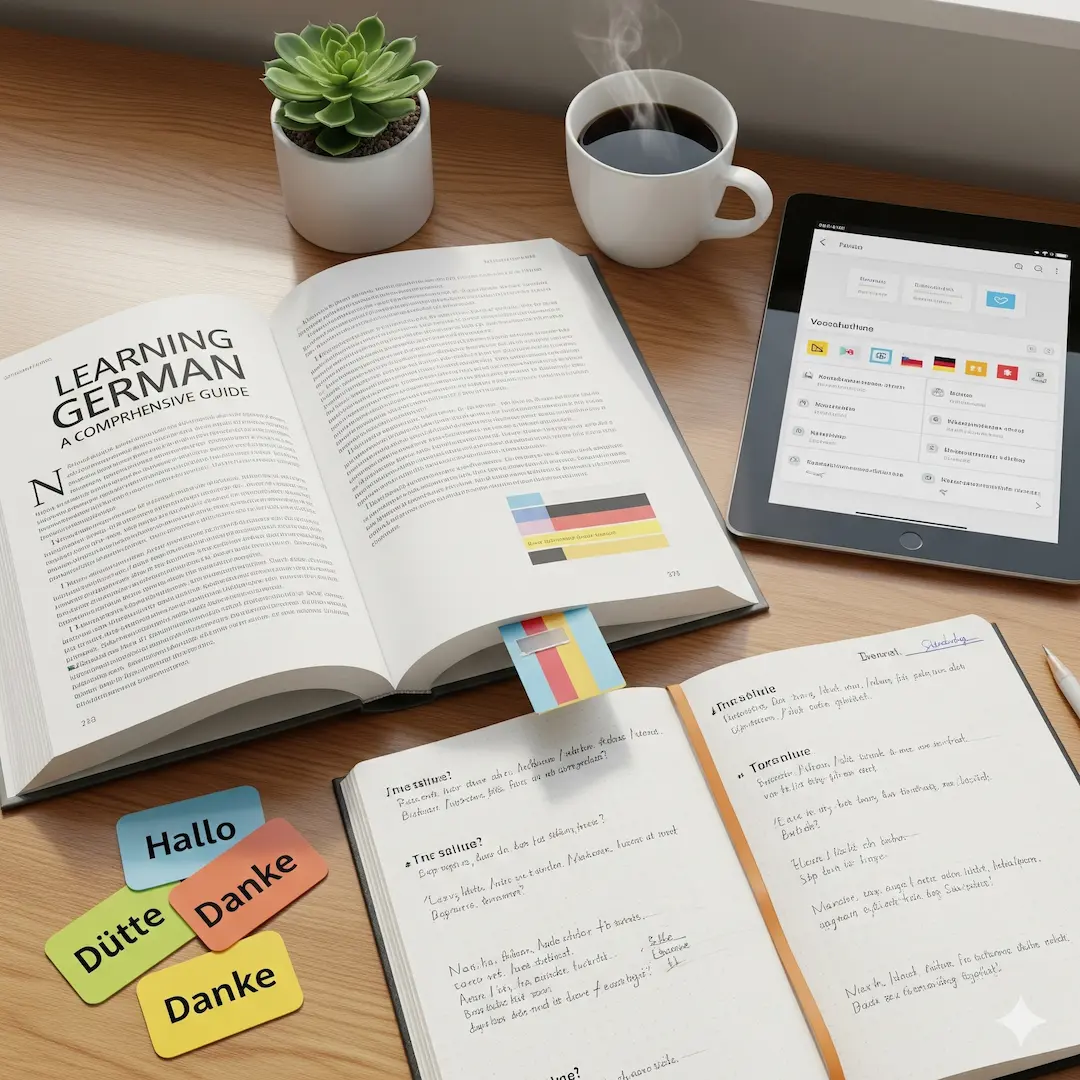The funniest German words and expressions
with English explanations and translations
- August 29, 2025
- By Tim Lorenz

Table of Content
Introduction
German and funny are rarely mentioned in the same sentence.
Perhaps unfairly?
Here are the funniest German words and expressions, including direct translations into English and English explanations so that non-native speakers can laugh along too.
And, find out how direct translations have even been the downfall of German celebrities such as Lena Meyer-Landrut and former Chancellor Helmut Kohl!
Funniest German Words and their Regional Treasures
Germany is extremely diverse linguistically, and depending on the region, very unique, often very charming expressions arise.
In the north, for example, people like to say ‘Lütt’, which means ‘small’ – an affectionate word for something tiny.
In eastern Germany, especially in Saxony and Brandenburg, a ladybird is called a ‘Motschekiebschen’. Not only does this sound cute, it also sounds a bit like a smacking kiss on the cheek.
In the west, you come across the word ‘Pillepalle’, which is used to dismiss something as unimportant or silly – a wonderfully derogatory belittlement.
And in the south, especially in Swabia, people sometimes say ‘blemblem’ when someone is no longer quite sane – in other words, crazy or nuts. Just as popular there is the phrase ‘Hock di her’, which in standard German simply means ‘Sit down’ – but in dialect it sounds almost like a little melody.
Wherever your journey takes you along the DACH countries, Tobian Language School has the right fun teacher to make sure you know about the small local differences too.

Classic Funny Words Throughout the Whole Country
The following words do not have a strong local or regional touch, but are deeply rooted in standard German (Hochdeutsch) language use throughout the entire country of Germany.
Number one: Ohrwurm (ear worm) – A catchy song stuck in your head.
Ohrwurm, this word should exist in other languages. It fascinates non-German speakers so much that it has made its way straight to the epicentre of Berlin’s freaky funky artsy expat community.
A local maestro explores the deeper meaning behind this word in his own unique form of high culture:
(Almost) all Germans also know these words, and they sum up dry, humorous creativity:
- Glotzen (to gawk/stare) – Looking intensely, often with wide eyes.
- Mach dich vom Acker (get off the field) – Meaning: ‘Go away!’
- Doppelhaushälfte (semi-detached house) – So precise it’s funny
- Eierlegende Wollmilchsau (egg-laying wool-milk-pig) – A mythical creature that does everything – used for unrealistic expectations.
- Erbsenzähler (pea counter) – Nitpicker.
- Eselsbrücke (donkey bridge) – Mnemonic device; a trick to remember something.
- Geheimratsecken (privy councillor’s corners) – Receding hairline.
- Ohrwurm (ear worm) – A catchy song stuck in your head.
- Booze number – Repeating digits like 111, 222.
- Spit sip – The final, gross bit of a drink.
- Mullet haircut – Mullet haircut.
- Ass violin – A creative insult.
- Vorführeffekt (demo effect) – When something fails right when you present it.
- Du hast einen Vogel (you have a bird) – You’re crazy.
- Drei Käse hoch (three cheeses high) – Very small child.
- Schniedelwutz (childish word for penis) – Funny-sounding euphemism.
- Blau sein (to be blue) – Means to be drunk in German.
- Weichei (soft egg) – Coward.
- Warmduscher (warm showerer) – Someone not tough enough.
- Schwarzfahren (black riding) – Riding without a ticket.
- Miststück (piece of dung) – An insult, quite colourful!
Cute, but not necessarily funny German words:
- Waschbär (washing bear) – Raccoon.
- Schmusen (to cuddle) – Very affectionate.
- Schildkröte (shield toad) – Turtle.
- Stubentiger (living room tiger) – House cat.
And to close this subchapter of funniest German words let see have a mellow touch:
- Backpfeifengesicht (slappable face) – Someone who just looks like they deserve a slap.
- Backpfeifengesicht is actually one of the most famous German punk bands – Die Ärzte (people (or the band itself?) say the best band in the world!) is dedicated to this one person who simply looks or behaves as if they could do with a slap in the face.
Linguistic German monsters
The phenomenon of compound words, i.e. words strung together, causes many a German student to break out in a cold sweat. The German language certainly doesn’t hold back when it comes to monster words:
- Rindfleischetikettierungsüberwachungsaufgabenübertragungsgesetz (law for delegation of beef labelling supervision tasks) – Luckily abolished in 2010. Rip.
- Sozialversicherungsfachangestelltenausbildung (training for social insurance specialists) – Still in use. Phew.
Idioms translated literally – Even the chickens are laughing
A particularly prominent example of how wonderfully wrong a literal translation can go was provided by former ESC winner Lena Meyer-Landrut – completely unintentionally.
During an interview with English-speaking journalists, she suddenly uttered the now legendary phrase: ‘I think I spider.’
What she actually wanted to say was the German exclamation ‘Ich glaube, ich spinne!’ (I think I’m going crazy!). This idiom is used in German when you experience something completely surprising or unbelievable. It essentially means ‘I think I’m going crazy’, ‘I can’t believe it’ or ‘That’s unbelievable’. But Lena translated the expression literally into English, which of course makes no sense in terms of content, but sounds all the more funny for it. The idea of suddenly being an arachnid caused many listeners to burst out laughing.
It is precisely these linguistic stumbling blocks that make learning a foreign language not only challenging, but also entertaining. And they show that even famous people make mistakes – and that’;s perfectly okay.
- Ich glaube, ich spinne = ‘I think I’m going crazy’ (literally: I think I spider)
- Mein lieber Herr Gesangsverein – My dear mister singing club = Expression of surprise
- Nicht das Gelbe vom Ei – Not the yellow of the egg = Not ideal
- Auf dem Holzweg sein – To be on the wooden path = To be wrong
- Ich glaub mein Schwein pfeift – I think my pig whistles = Shock or disbelief
- Das ist nicht mein Bier – That’s not my beer = Not my problem
- Da wird der Hund in der Pfanne verrückt – The dog goes crazy in the frying pan = Total amazement
- Da ist Hopfen und Malz verloren – Hops and malt are lost = All hope is gone
- Da lachen ja die Hühner – Even the chickens are laughing = That’s ridiculous
- Tomaten auf den Augen haben – To have tomatoes on your eyes = Not noticing the obvious
Why you should take your mistakes with a smile
Mistakes are human – and sometimes even legendary! Helmut Kohl, one of Germany’s most important chancellors, once said to Margaret Thatcher: ‘You can say you to me.’
He didn’t know that English doesn’t distinguish between formal and informal forms of address such as ‘Sie’ and ‘du’. A harmless mistake that shows that language is learned through use, not through perfection. Germans do still laugh about it, though.
Conclusion: Learn Funny German Words with a smile
German is full of quirky images, curious compound words and absurd humour.
At Tobian Language School, you will not only learn grammar and vocabulary, but also linguistic humour and everyday usage.
Our teachers ensure that you will smile while learning German – and still make rapid progress. We make sure you find all the Eselsbrücken you need to master your next certificate.
Try it out and discover how much fun German can be with private or group classes at the Tobian Language School!


